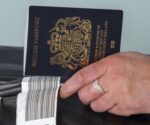Pilot’s wife shares security mistake you should never make | Travel News | Travel
Embarking on a plane journey, whether it is for a long-haul holiday, a quick getaway, visiting loved ones, or a work trip, is always thrilling.
To ensure you travel wihout a hitch, it’s usually recommended to get to the airport with plenty of time to catch your flight. However, this can be pretty boring and many of us turn to our phones for entertainment.
If you are doing this, be wary of draining all your battery. This is because a pilot’s wife has warned against using the USB charging points at airports.
Laurie, a content creator who shares travel tips and boasts 275,000 Instagram followers, has called it an “airport no no”. She claims that it could result in your personal information being hacked.
Laurie, who is from Houston, said: “Do not plug your phone in at airports. Hackers can steal your personal information in airports if you plug your phone into a free USB port to recharge.”
Instead, she advises using a blocker “so you do not get juice jacked.” Laurie added: “I pack them in a baggie or keep this in my pouch,” the pilot’s wife noted.
People found the advice very useful and took to the comments section to share their thoughts. One individual said: “I am so naive to traveling, I would have totally done that! Thank you for the tip!”
Another said: “So helpful.” And a third added: “Wow, this is scary.” Others also shared advice of their own, too.
A further commenter suggested: “Another option is to carry a battery pack to charge. They are pretty small these days.” That sounds like a smart plan to us!
More ways to keep your phones secure at the airport
1. Avoid Public Wi-Fi
- Don’t connect to free airport Wi-Fi unless absolutely necessary.
- If you must use it, avoid accessing sensitive information (banking, email, etc.).
- Forget the network after use.
2. Use a VPN
- A Virtual Private Network (VPN) encrypts your data, making it harder for hackers to intercept what you’re doing online.
3. Turn Off Automatic Connections
- Disable settings that automatically connect your phone to open Wi-Fi networks or Bluetooth devices.
4. Keep Your Phone Updated
- Make sure your phone’s operating system and apps are up to date with the latest security patches.
5. Use Strong Authentication
- Enable biometric authentication (fingerprint, face ID) or a strong password/PIN.
- Enable two-factor authentication (2FA) for important accounts.
6. Disable Bluetooth and AirDrop
- Turn off Bluetooth, AirDrop (iOS), and Nearby Share (Android) when not in use to prevent unauthorised connections.








